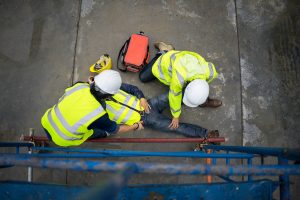Because of the actual evolution in the market, a big focus of Dr Kemper’s is urban planning and monuments protection law. As an expert in administrative law regarding the problems associated with construction lots, such as: construction logistic, noise and dust, he states: “There is a great lack of places to live in the greater cities in Germany. So, the trend is packing more and more housing constructions in the cities, and redeveloping buildings that are protected as monuments. The latter brings a lot of issues about the collision of new building standards and the targets of monuments conservations.
“Because of my studies in law and archaeology monuments protection law takes a special place in daily business.”
Besides consulting Dr Kemper is an assistant professor for monuments protection law at the University of Tuebingen and Kiel and is an author. He has also consulted in the legislative procedures for monuments protection legislation in federal state of Hassia and Schleswig-Holstein.
In what ways does the international scope differ to the local regulations in Germany that are currently in place?
Recently we have had a lot of lawsuits about the permit of the German market of construction materials. Because the EU does not solve all problems regarding the requirements of construction material, there are still national requirements that are not very well noticed.
Consulting in redevelopment projects we register quite often the problems of foreign investors with the German private construction law on the one hand and the urban planning/public construction and environmental law which is stamped by the federal legislative competence (f. e. we have 16 different monuments protection laws). So, we explain our clients a lot the legal structure in Germany to build up a good understanding by the client.
What challenges do you face during mediation? Is mediation a common method of resolving disputes in Germany?
Regarding administrative and infrastructural law, mediation is still in the beginning of its evolution. Some variations take place in the contraction between townships or in the procedures of public hearings during planning processes. But the communication with the public authorities on behalf of a development partner has to be quite meditative to guarantee success. Because the administrative law court proceedings take a very long time you have to look for chances to avoid it. So, you need good communicative skills and strategies to succeed in such a project.
I consult planning processes for railway projects. To reduce the conflict risk with the affected community members, we often use methods of mediation. I think a great advantage of mediation during mediation-like negotiation is the duty of discretion for the parties. Municipal authorities are especially interested in keeping lawsuits regarding to greater construction and planning projects, in secrecy. Finally, I think we can still learn a lot from the practice of mediation in the Anglo-American law sphere.
How has Germany addressed environmental concerns, in relation to changes in environmental legislation? What has the jurisdiction done to ensure corporate needs meet environmental concerns?
The first matter is on the balance of many interests and the challenges of future environmental and planning problems. From there, we can fix partnerships with companies regarding green energy and electric mobility. In electric mobility, Germany has passed the technical development from planning regulations cumbering the switch to electric mobility. A main goal in urban planning should be to plan the wires as early as possible to ensure the maintenance and the sufficient existence of charge columns. At the moment, the planning authorities are quite hesitant to do so. The result is there are many conflicts with the real estate owners, because it is not clear who has to tolerate a wire on his ground and who doesn’t. I think Germany could learn from Norway on examples on how it can do better.
Dr. Till Kemper M.A.
Rechtsanwalt & Mediator
Fachanwalt für Bau- und Architektenrecht
Fachanwalt für Vergaberecht
Fachanwalt für Verwaltungsrecht
Stephanstraße 3
60313 Frankfurt am Main
+49 (0) 69 / 97 58 22 - 122
E-Mail: kemper@hfk.de
www.hfk.de
Dr Till Kemper studied in Kiel, Tuebingen and Madrid (Spain) law and medieval archaeology (2003 to 2010). After university, he underwent practical juridical training in Munich and did his PhD in administrative Law (2011-2013). He started his professional life in Giessen in a law firm consulting in many branches, and specialised in construction law and administrative law. Since July 2016, he is a lawyer at HFK Rechtsanwaelte LLP in Frankfurt am Main.
HFK is a boutique with six offices all over Germany and approximately 50 lawyers specialised in real estate, construction and public procurement law.




















